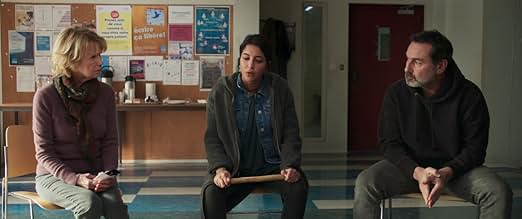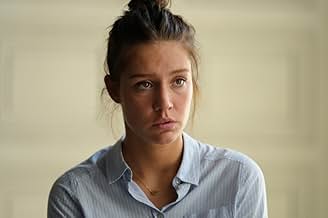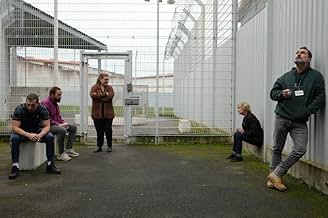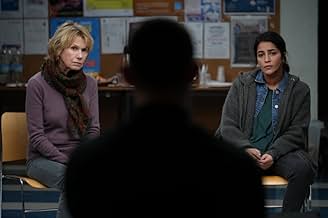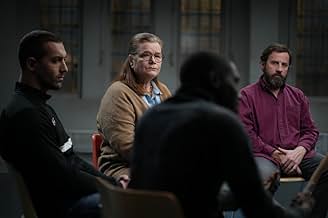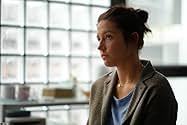Je verrai toujours vos visages
- 2023
- Tous publics
- 1h 58min
NOTE IMDb
7,5/10
4,4 k
MA NOTE
En France, la justice réparatrice a permis aux victimes et aux auteurs de délits de dialoguer dans le contexte de systèmes sécurisés, encadrés par des professionnels et des volontaires.En France, la justice réparatrice a permis aux victimes et aux auteurs de délits de dialoguer dans le contexte de systèmes sécurisés, encadrés par des professionnels et des volontaires.En France, la justice réparatrice a permis aux victimes et aux auteurs de délits de dialoguer dans le contexte de systèmes sécurisés, encadrés par des professionnels et des volontaires.
- Récompenses
- 1 victoire et 9 nominations au total
Suliane Brahim
- Fanny
- (as Suliane Brahim de la Comédie Française)
Denis Podalydès
- Paul
- (as Denis Podalydès de la Comédie Française)
Avis à la une
I believe in Empathy. And compassion. And forgiveness.
Hence the first scene was strong, astounding to me.
I heard something like: "No empathy here". Well, quite intriguing moto, I thought.
I was led through the parallel processes in the movie delighted by the sheer cleanness of accuracy of its point of view as well as THE LACK OF manipulating me to drown in bitter-sweet-cheap-drama.
Nearly all scenes exhibits a great opportunity to fall deep down sentimentalism - but Jeanne Herry keeps on being focused, consistent, on course.
With great appreciation as well as thanks I got a peek to a totally new way of approach to life's bumps, obstacles, pains.
I never heard about Restorative Justice before.
It's kind of wonder for me to see a way that generates Empathy, Compassion and Forgiveness - especially inwards, toward oneself maybe even before practicing it to others.
Hence the first scene was strong, astounding to me.
I heard something like: "No empathy here". Well, quite intriguing moto, I thought.
I was led through the parallel processes in the movie delighted by the sheer cleanness of accuracy of its point of view as well as THE LACK OF manipulating me to drown in bitter-sweet-cheap-drama.
Nearly all scenes exhibits a great opportunity to fall deep down sentimentalism - but Jeanne Herry keeps on being focused, consistent, on course.
With great appreciation as well as thanks I got a peek to a totally new way of approach to life's bumps, obstacles, pains.
I never heard about Restorative Justice before.
It's kind of wonder for me to see a way that generates Empathy, Compassion and Forgiveness - especially inwards, toward oneself maybe even before practicing it to others.
One film, one theme, two storylines. A confrontation between victims and perpetrators, which should have added value for each side. The one in which people with no direct connection meet seems to bring the desired insights and peace. Naive, but perhaps. Aversion, getting to know each other, understanding. Just a film, idealistic. But at least one that literally shows its colours regarding the perpetrators of the current crime terror over Europe. Of course, the usual explanations and excuses for the escalation of character are used: poverty, education, opportunities. Yawn. Everyone chooses their own exits at the crossroads of morality. But yes, otherwise this film would certainly not have ended up on the big screen, or would have been crucified by the media instead of being showered with awards. In my opinion, the softening of concepts such as perpetrator, victim and guilt are questionable approaches and primarily benefit injustice.
The other side works less well in its catharsis. Understandably, the resurgence of all pain through direct contact with the perpetrator is an emotional one-way street.
I went to see the film because it featured some of the cinematic greats of French cinema, but I can only recommend it to a limited extent. No resonance, no added value. Nevertheless, it is a high-quality production, well acted and at least endeavours to keep its feet on the ground. If I imagine this as a German production, ouch.
The other side works less well in its catharsis. Understandably, the resurgence of all pain through direct contact with the perpetrator is an emotional one-way street.
I went to see the film because it featured some of the cinematic greats of French cinema, but I can only recommend it to a limited extent. No resonance, no added value. Nevertheless, it is a high-quality production, well acted and at least endeavours to keep its feet on the ground. If I imagine this as a German production, ouch.
Authentic. It is the first word that comes to my mind after watching this French film. Victims and criminals meet in mediation with the aim of somehow coming to terms with painful experiences and moving on. So simple, but obviously very difficult.
The film is very good at conveying all the layers that exist in both the victims and the aggressors. It feels like a mixture of documentary and drama, but above all this film is insightful and strong in its narrative. In any case, what is striking is how important communication is. To meet, to tell, to look each other in the eye. Bearing in mind that 80 percent of offenders in prison commit new crimes (a fact in my home country), the film shows another and important angle of focus on changing behaviour. For the victims, this form of mediation means a high price, re-traumatisation and an experience of losing the little control they at least feel they have. But the way also gives them hope for change.
The film does not give any conclusion as to whether this is the right way to focus on crime, but it at least tells us that there are opportunities to move forward.
Very good character actors provide an intensity and nerve that is often missing in films today. Without them, this film's message would not have been as powerful as it is here.
The film has many strong moments, and you will certainly not sit back unmoved after watching it.
The film is very good at conveying all the layers that exist in both the victims and the aggressors. It feels like a mixture of documentary and drama, but above all this film is insightful and strong in its narrative. In any case, what is striking is how important communication is. To meet, to tell, to look each other in the eye. Bearing in mind that 80 percent of offenders in prison commit new crimes (a fact in my home country), the film shows another and important angle of focus on changing behaviour. For the victims, this form of mediation means a high price, re-traumatisation and an experience of losing the little control they at least feel they have. But the way also gives them hope for change.
The film does not give any conclusion as to whether this is the right way to focus on crime, but it at least tells us that there are opportunities to move forward.
Very good character actors provide an intensity and nerve that is often missing in films today. Without them, this film's message would not have been as powerful as it is here.
The film has many strong moments, and you will certainly not sit back unmoved after watching it.
A major problem with the criminal justice systems in assorted countries - including the United States - is that they emphasize punishment over rehabilitation; one might say that these are criminal injustice systems. I don't know how it works in France, but Jeanne Herry's "Je verrai toujours vos visages" ("All Your Faces" in English) offers a possibility: restorative justice. This regimen features discussions between inmates and their victims.
It's not always a smooth process, as there's plenty of tension between people (especially due to the variety of races). Nonetheless, there's the chance of forgiveness and increased understanding of the causes of anything defined as crime. I wouldn't call it a masterpiece, but it's worth seeing. I don't know if it's available on any streaming service, so you might have to check a neighborhood video store.
The cast includes Miou-Miou and Adèle Exarchopoulos (who more recently voiced Ennui in "Inside Out 2").
It's not always a smooth process, as there's plenty of tension between people (especially due to the variety of races). Nonetheless, there's the chance of forgiveness and increased understanding of the causes of anything defined as crime. I wouldn't call it a masterpiece, but it's worth seeing. I don't know if it's available on any streaming service, so you might have to check a neighborhood video store.
The cast includes Miou-Miou and Adèle Exarchopoulos (who more recently voiced Ennui in "Inside Out 2").
The topic is not the same, but the overall atmosphere and more or less scheme, kind of drama, reminded me TWELVE ANGRY MEN, a story which takes mostly place in one room - whithout being a trial - involving people, men and woman, victims and perpetrators, facing each other, and trying to talk, explaining, showing, confessing what they felt....it has never been done before and that makes it even more powerful, astounding. It is purely stunning. Terrific dialogues. However, I can understand that some audiences may be annoyed , because it is naive, unrealistic. That's a matter of taste, point of view, that depends of which angle you watch it. Something is wrong in the story lines, when a young hoodlums speaks of a home jacking where he and his pals took credit cards with the secret code to retrieve money from the cash machines. In France, with a credit card - stolen or not - you can retrieve ONLY 400 euros each week. So when this hoodlum says that one of his pals bought a new motorcycle with his share of the loot, that's not possible.... The hoodlums could only at best retrieve 400 euros. Because a few hours after the homejacking, the victimes have necessarily declared the robbery to their bank. 400 euros shared between three, that's doesn't allow anyone to buy a new motorcycle. No way. And the most unusual is that you have two different stories in this film: the group and Chloée character problems with her half brother. They never meet. Strange but why not.
Le saviez-vous
- AnecdotesTo research the subject, writer/director Jeanne Herry couldn't take part in actual meetings of restorative justice, given that they are supposed to be a safe place, and nothing that is said there is meant to be told elsewhere. So instead, she went through three formations, which she felt were very insightful: the one which Fanny and Michel go through in the movie, the one to be a mediator, like Judith in the movie, and one in Québec via Zoom.
- ConnexionsReferences 12 Hommes en colère (1957)
Meilleurs choix
Connectez-vous pour évaluer et suivre la liste de favoris afin de recevoir des recommandations personnalisées
- How long is All Your Faces?Alimenté par Alexa
Détails
- Date de sortie
- Pays d’origine
- Site officiel
- Langue
- Aussi connu sous le nom de
- Las dos caras de la justicia
- Lieux de tournage
- Place des Prêcheurs, Aix-en-Provence, Bouches-du-Rhône, France(Chloé's apartment)
- Sociétés de production
- Voir plus de crédits d'entreprise sur IMDbPro
Box-office
- Montant brut mondial
- 9 065 011 $US
- Durée1 heure 58 minutes
- Couleur
- Rapport de forme
- 2.39 : 1
Contribuer à cette page
Suggérer une modification ou ajouter du contenu manquant

Lacune principale
By what name was Je verrai toujours vos visages (2023) officially released in Canada in French?
Répondre
![Regarder Bande-annonce [OV]](https://m.media-amazon.com/images/M/MV5BZWYwMjBhODctNzBkMS00YTNmLWFmMWMtMzExNTc0MmIxYzI2XkEyXkFqcGdeQXRyYW5zY29kZS13b3JrZmxvdw@@._V1_QL75_UX500_CR0)
